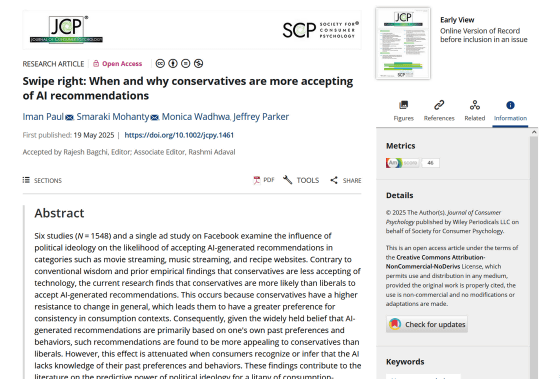Research shows conservatives are more likely to accept 'recommendations made by AI' than liberals

In recent years, 'AI-selected recommendations' have become increasingly common on music and video streaming services, recipe sites, and other platforms. A study examining the relationship between people's tendency to accept AI recommendations and their political ideology found that conservatives are more likely to accept AI-selected recommendations than liberals.
Swipe right: When and why conservatives are more accepting of AI recommendations - Paul - Journal of Consumer Psychology - Wiley Online Library

Conservatives are more receptive to AI-generated recommendations than liberals, study finds
https://www.psypost.org/conservatives-are-more-receptive-to-ai-generated-recommendations-than-liberals-study-finds/
Consumers are exposed to AI recommendations in all sorts of situations in their daily lives, such as recommended shows on Netflix, songs played on Spotify, and recipes featured in cooking apps. While much research has focused on how to improve the accuracy of these recommendation systems, less attention has been paid to who is more likely to accept AI recommendations.
Political ideology is known to influence a wide range of consumer behavior, from brand preferences to food choices. Therefore, a research team led by Iman Paul, a professor of business administration at Montclair State University in New Jersey, USA, investigated the impact of political ideology on the acceptance of AI recommendations.

In a series of online experiments, the researchers asked participants to imagine and respond to AI-generated recommendations for movies, music, and recipes. In some experiments, participants were told that the recommendations were based on their own past preferences. In other experiments, participants were told that the recommendations were novel or different from what they normally consume.
The participants also rated their own political ideology on a scale ranging from liberal to conservative, and the research team used this data to analyze how conservatives and liberals differ in their receptivity to AI recommendations.
The researchers also conducted an experiment using a Facebook ad campaign promoting an AI-generated music playlist. The ad campaign was conducted in the United States, and regions were classified as 'liberal' or 'conservative' based on 2020 voting data to examine how click-through rates for the ad varied across regions.

Our analysis consistently found that, contrary to the notion that conservatives are skeptical of new technologies, conservatives are more likely than liberals to accept AI recommendations. Furthermore, this preference for AI recommendations is consistent across all services, and real-world research using Facebook ad campaigns confirmed higher click-through rates in conservative-leaning areas.
In one experiment, researchers found that traits strongly associated with conservatives—resistance to change and a preference for consistency—statistically explained why conservatives were more likely to follow AI recommendations. When the recommendations contradicted the user's preferences or came from a new, unfamiliar service, the differences due to political ideology disappeared.
In an experiment where participants were asked to choose between an app that recommended music based solely on their listening history and an app that recommended new and unexpected music, conservatives were significantly more likely to choose the app that recommended music based solely on their listening history, while liberals were split almost evenly.

These results suggest that conservatives tend to prefer consistent and familiar experiences, which may make them more receptive to AI that makes recommendations based on their past history and preferences. However, because this study focused on low-risk situations such as everyday consumer behavior, it is unclear whether similar reactions would be observed in higher-risk situations such as healthcare or self-driving cars.
PsyPost, a psychology media outlet, said, 'Future research could explore how these patterns extend to other areas, such as political messaging, financial advice, or public health interventions. It would also be useful to consider how these preferences change as people gain more experience interacting with AI-based systems.'
in Web Service, Science, Posted by log1h_ik